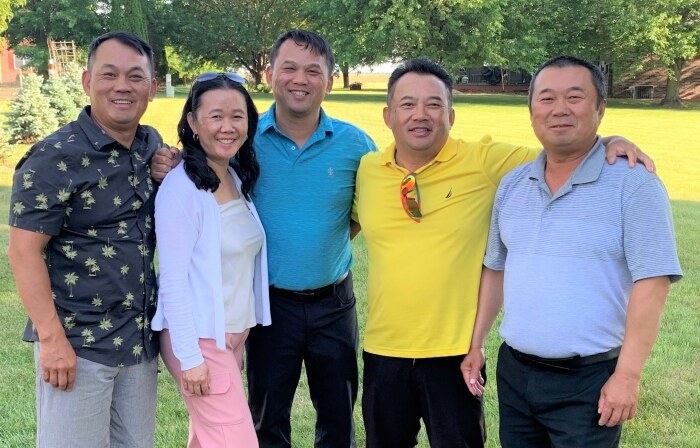Randy Evans is executive director of the Iowa Freedom of Information Council and can be reached at DMRevans2810@gmail.com.
Sue and I were in Washington, Iowa, last month for a high school graduation.
It was a special occasion because the people we joined with in honoring young Cameron, the newly minted Washington High School grad, have been our friends for almost 44 years.
It is important to know that while family and friends gathered to celebrate this milestone in the young man’s life, there was one noteworthy person close to the family’s heart who was there in spirit, because he truly made this wonderful day possible.
That person was the late Robert Ray, Iowa’s former governor, who died in 2018. He is a revered figure in the lives of Cameron’s extended family and in the lives of thousands of immigrant families.
Forty-four years ago, on a Sunday morning in October 1979, Cameron’s father, Cameron’s paternal grandparents and the handsome young man’s aunt and three uncles first set foot in Iowa. A chartered jumbo jet brought them and nearly 230 other immigrants halfway around the world from their former homes in Laos.
Cameron’s dad, Tou Vongpanya, was just 4 years old then. Cameron’s grandfather, Oth Vongpanya, carried the little boy down the steps from the jet. All the family’s possessions were tucked into one suitcase and one cardboard box.
The Vongpanya family—five siblings, ages 4 to 14, and their parents, Oth and La—came to Iowa because Governor Robert Ray invited war-weary refugees from Southeast Asia to start new lives in this state, in places like Bloomfield, Fairfield, and Ottumwa. No longer would these refugees have to fear communists might kill them in retaliation for working for the United States government during the Vietnam War.
Sue was among a handful of Bloomfield residents who greeted the Vongpanyas that morning and escorted them to their new home in Bloomfield. Decades later, the Vongpanya kids still express their gratitude for the way the community rallied around them, finding them a home and stocking it with furniture and clothes, helping Oth line up a job, providing tutors to help the kids learn English, and above all else, treating them with dignity and compassion.
They know the people of Iowa, and Governor Ray, gave them a life-changing opportunity—and hope. The Vongpanyas have worked hard since that fateful day in 1979 to be worthy of the blessing this state provided to them.
I am confident Ray would be proud of what Oth and La and their kids have achieved. All five of their kids graduated from high school. They earned college degrees. They have married and started their own families. They have purchased houses, been gainfully employed, and served in the United States military. They have been on community boards and all are U.S. citizens.
Advanced age kept Oth and La from the celebration in Washington. When you uproot and relocate half a world away, family takes on extra-special importance. So, all five Vongpanya siblings were there in Washington. So were spouses and kids, aunts, uncles and cousins. This scene will be repeated in the coming years, because Tou and his wife, Pam, have two boys younger than Cameron.
The Vongpanyas were beaming over the recent announcement that Ray’s grandson is getting married this summer to the daughter of another refugee who came to Iowa in the 1970s.
The Vongpanya story is as old as the United States. Whether we want to acknowledge it or not, this is a country primarily of immigrants. My own ancestors came from northern Europe years before the Declaration of Independence was signed 247 years ago. My family eventually settled in the gently rolling hills of Davis County six years before Iowa became a state in 1846.
Although the Evanses have been in the United States for a very long time, my ancestors came for the same reasons the Vongpanyas and immigrants throughout our nation’s history have arrived here. We have all wanted safety and security, food for our families, education for our kids, jobs, and a chance for a fresh start so we can live lives that are more secure and a little brighter than our forebears’.
The emotions were palpable that recent afternoon in Washington when the Vongpanyas talked about those times decades ago in Iowa, when Oth worked as a custodian and tended to people’s lawns and snowy sidewalks to provide for his family. The kids talked about working hard to live up to their parents’ high expectations for them.
Through Ray’s leadership, Iowa welcomed roughly 10,000 refugees from Southeast Asia in the 1970s and 1980s. Before his death in 2018, Ray often said of those immigrants, and it certainly applies to the Vongpanyas:
We are proud of all you have achieved. You have enriched our lives and strengthened our state.
Photo by Sue Evans: The Vongpanya kids paused for a group photo during the graduation open house last month in Washington for the oldest son of Tou and Pam Vongpanya. The kids are, from the left, in chronological order: Tou, Tengonne (who goes by Teng), Phonthip (who goes by Tee), Seng (who goes by TC), and Chay.



1 Comment
thank you
Good article.
ModerateDem Mon 5 Jun 1:58 PM